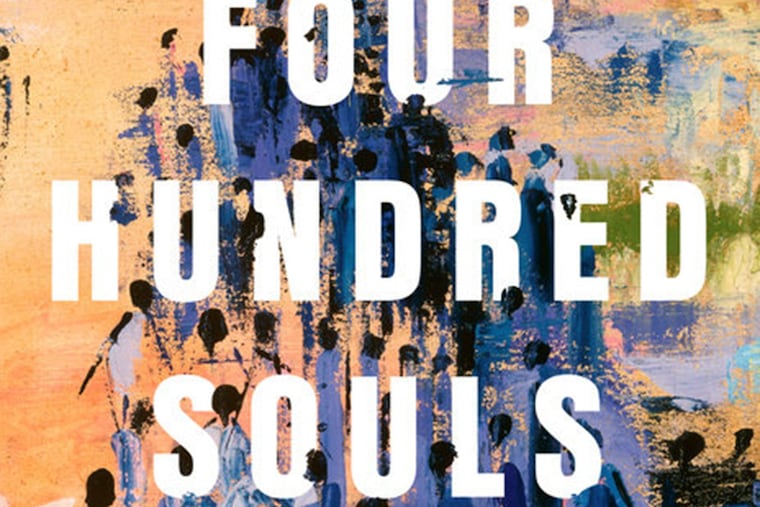A choir of voices recounts Black history in ‘Four Hundred Souls’ | Book review
Edited by Ibram X. Kendi ("How to Be An Antiracist) and Keisha N. Blain, the collection's an overview of four centuries of the history of Americans of African descent, told by 90 different voices.

Four Hundred Souls: A Community History of African America, 1619-2019
Edited by Ibram X. Kendi and Keisha N. Blain
One World. 528 pp. $32
Reviewed by Colette Bancroft
As historian Ibram X. Kendi points out in his rousing introduction to Four Hundred Souls: A Community History of African America, 1619-2019, histories “of Black America have almost always been written by a single individual, usually a man.”
Kendi suggests an alternative: “Why not a Black choir singing the spiritual into the heavens of history?”
Four Hundred Souls is that book, an overview of four centuries of the history of Americans of African descent, told by 90 different voices. Whether you know only a little about Black history or a great deal, it’s a rich and rewarding book.
Kendi was a professor at the University of Florida when he published Stamped From the Beginning: The Definitive History of Racist Ideas in America, which in 2016 made him the youngest winner ever, at 34, of the National Book Award for nonfiction. His bestselling How to Be an Antiracist topped “antiracist reading lists” in the summer of 2020, the same year that Time named him one of the world’s 100 most influential people. He now holds the Andrew W. Mellon endowed professorship at Boston University.
His coeditor, Keisha N. Blain, a professor of African American history at the University of Pittsburgh, has published extensively on race, gender, and politics.
Contributors to Four Hundred Souls include historians like Annette Gordon-Reed and Isabel Wilkerson as well as journalists like Jamelle Bouie and Nikole Hannah-Jones, and activists like the Rev. William Barber, Angela Davis, and Alicia Garza. There are essays by political operatives Donna Brazile and Karine Jean-Pierre, sports author Howard Bryant, medical journalist Harriet A. Washington, novelists Mitchell S. Jackson and Bernice L. McFadden, memoirist Kiese Laymon, and many more.
The essays are divided into 10 sections, each section covering 40 years between 1619 — the year of the first recorded arrival of enslaved Africans on American shores — and 2019. Each writer was assigned a five-year period; some focused on events, some on individuals, some on cultural or political trends.
Bouie’s essay on the Civil War centers on the 180,000 African Americans who fought in the Union Army, many of whom had fled slavery. “But the significance of Black soldiers,” he writes, “went beyond their military prowess.” Their organizational skills led many of them to become powerful forces in their communities and in politics after the war, “using the fruits of that service to help secure rights for the community at large.”
Some essays on individuals shine new light on well-known figures like Phillis Wheatley and Booker T. Washington. Others bring forward people history has largely left behind. Harriet A. Washington’s essay is on James McCune Smith, a Black New Yorker who in 1837 graduated as valedictorian of his medical school class. He had to attend the University of Glasgow because no U.S. college would admit him, but he brought his medical degree back to New York and led a remarkable life.
The essays are organized chronologically, but there are thematic threads that connect them from century to century. The third essay, “Whipped for Lying With a Black Woman” by author Ijeoma Oluo, combines the history of a 1630 court order that presaged the infamous “one-drop rule” to Oluo’s personal experience as the daughter of a Black father and white mother: “You cannot become partly white.”
That thread — of sex between whites and Blacks as both one of the deepest taboos of racism and one of the most common expressions of white power over Black people, especially women — appears over and over. It’s in Gordon-Reed’s essay about why Sally Hemings, the enslaved woman who bore six of Thomas Jefferson’s children, was brought to Paris as a teenager, and why Jefferson sent her back to Virginia.
It runs through Crystal N. Feimster’s essay “Lynching,” about the stunningly courageous antilynching campaign of Black journalist Ida B. Wells-Barnett in the late 19th century. At that time, waves of mob violence by white supremacists were often blamed on sexual assaults by Black men, but Wells-Barnett’s investigations found that lynching “was not about protecting Southern womanhood but had everything to do with shoring up white men’s social, economic, and political power — in other words, white male supremacy.”
And that thread comes closer in Salamishah Tillet’s wrenching recounting of Anita Hill’s testimony during the 1991 confirmation hearings for Supreme Court Justice Clarence Thomas. “Republicans,” Tillet writes, “drew on centuries of sexist images of women as delusional, and racist ideas of Black women as hypersexual.”
Other threads bind other essays together, with stories that are sometimes tragic, but often triumphant. Each of the book’s 10 sections is punctuated at the end by a poem, original works by brilliant Black poets like Jericho Brown, Patricia Smith, and Ishmael Reed.
Brown’s poem, “Upon Arrival,” imagines those first enslaved Africans arriving on the shore of Virginia in 1619, and it speaks to the intent of all of Four Hundred Souls:
“Though I know who caught them, sold them, bought them,
I’d rather focus on their faces, their names.”
From the Tampa Bay Times.